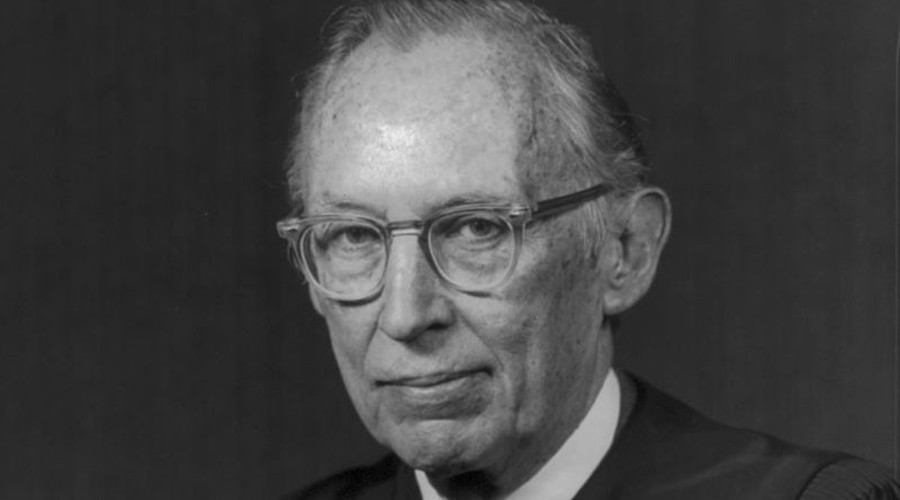45
yrs ago this week, a memo launched the corporate takeover of the US
govt

Justice
Lewis Powell changed the world with one memo. © wikipedia.org
RT,
24 August, 2016Forty-five years ago this week, a single memo written by Lewis Powell kicked off the corporate takeover of the US government and inspired a generation of think tanks, lobbyists, and dirty money.
Powell
was addressing concerns held by conservatives surrounding the New
Deal and the Great Society, which included Social Security, the Labor
Relations Act, Medicare, Medicaid, and anti-discrimination laws.
In
his memo, he said it was time to fight back against the "Attack
of the American Free Enterprise System" from “perfectly
respectable elements of society” like
the “college
campus, the pulpit, the media, the intellectual and literary
journals, the arts and sciences and from politicians.”
Describing
them as being the most articulate, the most vocal, and the most
prolific in their writing and speaking, Powell said, “Strength
lies in organization, in careful long-range planning and
implementation, in consistency of action over an indefinite period of
years, in the scale of financing available only through joint effort,
and in the political power available only through united action and
national organizations."
#KochBrothers are buying influence on college campuses. Students are protesting with #unkochmycampus http://www.wisconsingazette.com/trending/political-footballbreakkoch-industries-makes-play-on-college-campuses.html …
Colleges
were targeted for their liberal teachings, with Powell calling
for “constructive
action” to
include staffing colleges with those who “believe
in the system”,
applying pressure to ensure the right sort of speakers appear on
campus, and keeping textbooks “under
constant surveillance.”
The
memo called for business to play “a
broader and more vigorous role in the political arena” through
campaign financing and advertising.
#ImWithHer
Big Clinton $ donor who approved that business was more important than human rights with China (see PS)
Powell
pointed to the fact that much of the media “are
owned and theoretically controlled by corporations which depend upon
profits, and the enterprise system to survive.”
He
called for monitoring of media content, the challenging of media
outlets critical to their views and making complaints against said
outlets.
The
late justice lamented the fact that newsstands had “almost
no attractive, well-written paperbacks or pamphlets on ‘our side.’”
BASED COULTER'S NEW BOOK, WORTH IT JUST FOR THE COVER! (Out August 23) http://sh.st/ZVKA8
For
Powell, the Chamber of Commerce held a vital role due to
its “strategic
position.”
Having
fought the government on behalf of the Tobacco Institute to prevent
warnings about the dangers of smoking, he highlighted the courts as
being a “vast
area of opportunity.”
Two
months later, he would be appointed to the top court in the country
by President Nixon.
Powell
recognized that businessmen were not “trained
or equipped to conduct guerrilla warfare with those who propagandize
against the system,” but
called for the “wisdom,
ingenuity and resources of American business to be marshaled against
those who would destroy it.”
Influenced
by his memo, corporate activists and the Chamber began to build
institutions to change public opinions. They set up think tanks and
created media platforms to influence opinion and subsequently shape
policy.
Having an issue with Clinton, State Department, and Foundation? Think Cheney, Iraq War, and Halliburton. Then add profits. #Ethics
The
Heritage Foundation, Cato Institute, the Manhattan Institute, and
many more were the result of the Powell Memo.
The Powell memo inspired the creation of Heritage Foundation, Manhattan Institute, Cato Institute etc. http://reclaimdemocracy.org/powell_memo_lewis/ …
The Koch brothers and other wealthy businessmen began to pour money into conservative media and politics, while the neo-liberals took a page from their playbook and started to influence the Democratic party, particularly during Bill Clinton’s presidency in the 1990s.
The Koch brothers sought power to control academic hiring in return for university donations.
 Lee Fang
Lee Fang









 Wisconsin Gazette
Wisconsin Gazette
 Charles R. Smith
Charles R. Smith


 Politic2k
Politic2k
 Geo Atlantis
Geo Atlantis

 MarathonBear
MarathonBear


 Justa Fan
Justa Fan
 J
J







 Dæv Bee
Dæv Bee
No comments:
Post a Comment
Note: only a member of this blog may post a comment.